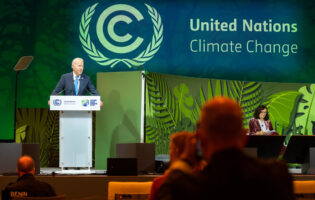Germany: Inactive but Indispensable?

Jackson Janes
President Emeritus of AGI
Jackson Janes is the President Emeritus of the American-German Institute at the Johns Hopkins University in Washington, DC, where he has been affiliated since 1989.
Dr. Janes has been engaged in German-American affairs in numerous capacities over many years. He has studied and taught in German universities in Freiburg, Giessen and Tübingen. He was the Director of the German-American Institute in Tübingen (1977-1980) and then directed the European office of The German Marshall Fund of the United States in Bonn (1980-1985). Before joining AICGS, he served as Director of Program Development at the University Center for International Studies at the University of Pittsburgh (1986-1988). He was also Chair of the German Speaking Areas in Europe Program at the Foreign Service Institute in Washington, DC, from 1999-2000 and is Honorary President of the International Association for the Study of German Politics .
Dr. Janes is a member of the Council on Foreign Relations, the International Institute for Strategic Studies, the Atlantic Council of the United States, and American Purpose. He serves on the advisory boards of the Berlin office of the American Jewish Committee, and the Beirat der Zeitschrift für Außen- und Sicherheitspolitik (ZfAS). He serves on the Selection Committee for the Bundeskanzler Fellowships for the Alexander von Humboldt Foundation.
Dr. Janes has lectured throughout Europe and the United States and has published extensively on issues dealing with Germany, German-American relations, and transatlantic affairs. In addition to regular commentary given to European and American news radio, he has appeared on CBS, CNN, C-SPAN, PBS, CBC, and is a frequent commentator on German television. Dr. Janes is listed in Who’s Who in America and Who’s Who in Education.
In 2005, Dr. Janes was awarded the Officer’s Cross of the Order of Merit of the Federal Republic of Germany, Germany’s highest civilian award.
Education:
Ph.D., International Relations, Claremont Graduate School, Claremont, California
M.A., Divinity School, University of Chicago
B.A., Sociology, Colgate University
Expertise:
Transatlantic relations, German-American relations, domestic German politics, German-EU relations, transatlantic affairs.
__
This week in Berlin was marked by a widely heard speech by the Polish Foreign Minister – Radek Sikorski – who managed to formulate in two sentences what many Germans have been debating about: the role of German leadership in Europe. “I fear German power less than I am beginning to fear its inactivity. You have become Europe’s indispensable nation.”
This was aimed squarely at Germany’s role and responsibility in dealing with the euro crisis, which Sikorski labeled the biggest threat to Polish security and the survival of the European project.
Appeal For German Leadership
As Poland has the intention of joining the euro zone, it has a particular interest in its stability. But the appeal for German leadership, coming from a country that has been the victim of German power going back centuries, was surprisingly candid.
One might speculate about the potential of a similar direct appeal coming from other European partners, be it France or Hungary, the United Kingdom or Italy. It is doubtful that it would be formulated in the same way, or at all, but the facts speak for themselves. Germany is indispensable as the anchor for the euro zone and with that role comes power, size, leverage, and leadership.
The problem is: Germans usually don’t like talking explicitly about their role as leaders. The language of leadership is usually framed around the idea of common goals and shared burdens, avoiding an over emphasis on German interests. When one leading member of the German Parliament recently let loose with the sentence − in connection with the efforts to reform the euro zone − “now German is spoken in Europe”, all of the available German stereotypes instantly appeared in European media – especially in the United Kingdom. Despite the fact that there is some truth to what Volker Kauder said, it was a reminder of the hazards Germany still faces in exerting its leadership.
Bystander Effect
Minister Sikorski argued that no one else but Germany can help the euro zone survive and prosper – a fact which is not contested as the most powerful economy on the continent. He also added that Germany was not a bystander as today’s problems evolved during the past several years. Yet, how the argument is made, and by whom, is of importance in measuring its impact.
Chancellor Merkel has been consistent in always emphasizing that Germany’s interests are in sync with a stable Euro and a strong Europe. However, she does so while arguing that her European partners need to commit to a Europe which is built around the values that help Germany become successful and powerful.
Clearly, different national paths to today’s dilemmas in Europe do not generate a consensus easily, and Merkel does not expect to make Germans out of Greeks or Italians. Yet, the need for a code of conduct and a method of enforcing it within the euro zone is at the basis of finding a way out of the current economic storm in Europe.
Reserved Leadership
In some ways, Germany’s tactics in Europe have always been in the style of leading from behind the scenes. When the French reached for the leadership role in the early stages of European integration, Germany acquiesced to their needs, even as Germany’s influence continued to grow. Following unification, Helmut Kohl was aware that Germany now represented a threat to many who still carried the scars of World War II and he pushed quickly for a larger and more encompassing Europe to envelop the new Germany of post 1990.
Two decades later, Chancellor Merkel follows that same course of ostensibly trying to lead from behind while still very capable of setting the agenda in Brussels and elsewhere in the European theater. It is partly this course that has held up Germany from pursuing many formal leadership roles in Brussels, leaving the French and others to fight over them while it works at other levels in the process of European politics.
Merkel is also aware that she is charting a course through a very messy domestic political environment – and within a shaky coalition which could possibly collapse at some point between now and the next scheduled elections in September of 2013.
Both the situation at home and within the EU framework cause Merkel to employ the decision-making process which many criticize as sluggish, overly cautious and uncertain, but which she has utilized so far with success for herself. She has just completed her sixth consecutive year as Chancellor and is clearly in the driver’s seat in the EU.
A 21st Century Approach
Some of Merkel’s advisors argue that the leadership style of the 20th century in Europe does not transfer to an environment of the 21st century marked by far more diffusion of power and far more actors on the stage. Merkel fits that new challenge with her methods.
Yet, what has worked for Merkel, and what worked for her predecessors, does not always yield success. Helmut Kohl used his style to steer Germany to unification, but then was unable to manage its aftermath effectively. Merkel has drawn on her own personal skills, as well as her style of German consensus building, to manage her way through the very complicated and dangerous path thus far. Given Germany’s key role, Merkel is going to be the object of both criticism and praise in equal measures. That is the price of a leadership role.
Ultimately, the Chancellor will be measured by her success and failures in defining the challenges ahead for Germany and Europe, explaining them to her public and her partners, and demonstrating results to both. How she does all of that will define her style of leadership. Right now, Merkel and Germany are, as Minister Sikorski points out, indispensable. The challenge now is to explain how solving the euro crisis is also going to be indispensable for far more than Germany.








